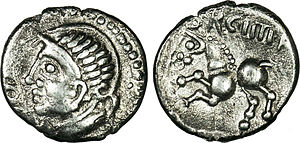- Orgetorix
-
Orgetorix was a wealthy aristocrat among the Helvetii, a Celtic-speaking people residing in what is now Switzerland during the consulship of Julius Caesar of the Roman Republic. In 61 BC he convinced the Helvetians to attempt to migrate from Helvetian territory to south-western Gaul (modern-day France). He was also party to a clandestine arrangement with Dumnorix of the Aedui and Casticus of the Sequani to seize control of their respective tribes by arms and between them rule most of Gaul. The conspiracy was denounced, Orgetorix was called to a hearing in chains before the government of the Helvetii, he arrived with a small army, and was released but died mysteriously, a rumored suicide. The Helvetians went on with their plans for migration but were defeated in 58 BC and returned by Julius Caesar. This incident was the beginning of the Gallic War in which Caesar subjugated the Celts of Europe.
Contents
Etymology
Julius Pokorny segments the name [P]orgeto-rix, where the first element contains Gallic orge, "kill,", related to Old Irish orcaid, "kill," from the Indo-European root *per-g-, "to hit."[1] The second element is manifestly Celtic rīx, "king:" "warrior-king," which does not imply that the owner of the name is necessarily a legal ruler. Although Orgetorix had aspirations in that direction, he was not one.
Social position
Plan for migration
The effort came by way of marital exchange and individual alliances among some of the young nobles from all three tribes.
Conspiracy
Trial
Rivals among the Helvetii discovered Orgetorix's illegal plot and moved to put him on trial, with the penalty of death by burning if found guilty. Assisting his efforts to avoid that fate, Orgetorix had meanwhile acquired a significant personal retinue in addition to having called up an army of more than 10,000 men at arms in addition to their mobilized clients, followers and dependents.
Death
As the Helvetii, Aeduii and Sequanii all strained at their respective councils and halls, amid much stress and lament, Orgetorix was murdered in his encampment.
Notes
- ^ Pokorny, Julius (2005) [1959]. "per-3, per-g-". indogermanisches etymologisches woerterbuch. Leiden: Leiden University, the IEED-project. pp. 818–819. http://www.indoeuropean.nl/cgi-bin/startq.cgi?flags=endnnnl&root=leiden&basename=%5Cdata%5Cie%5Cpokorny.
Bibliography
- Julius Caesar, Commentarii de Bello Gallico 1.2
- Dio Cassius, Roman History 38.31
- Orosius, Seven Books of History Against the Pagans 6.7
Celts Ancient Celts
Celtic studiesPlacesGaelic Ireland · Dálriata / Alba · Iron Age Britain / Roman Britain / Sub-Roman Britain ·
Iron Age Gaul / Roman Gaul · Galatia · Gallaecia · Britonia · Balkans · TransylvaniaReligionSociety
Modern Celts
Celtic RevivalLanguages Proto-Celtic · Insular Celtic (Brythonic · Goidelic) · Continental Celtic (Celtiberian · Gaulish · Galatian · Gallaecian · Lepontic · Noric)Festivals Lists Celts · Tribes · Deities · English words of Celtic origin · Spanish words of Celtic origin · Galician words of Celtic origin · French words of Gaulish origin
This European biographical article is a stub. You can help Wikipedia by expanding it.

